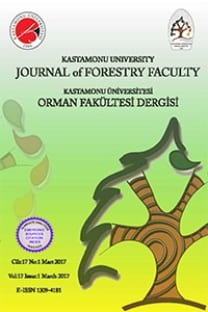Sugi Diri ve Öz Odununda Bor, Flor ve Bakır Dağılımı: Elementler Arasındaki Etkileşimler
Bor, Flor, Bakır, Yerinde Bakım, Etkileşim
Boron, Fluoride and Copper Distribution in Treated Sugi Sapwood and Heartwood: Interactions Between the Elements
Boron, Fluoride, Copper, Remedial Treatments, Interaction,
___
- American Wood Protection Association (AWPA). (2006). Standard A2. Analysis of waterborne preservatives and fire-retardant formulations. Method 7. Determination of fluoride in wood and solutions. In: AWPA Book of Standards. AWPA, Selma, AL., 236-237.
- American Wood Protection Association (AWPA). (2012). Standard wet ashing procedures for preparing wood for chemical analyses. Standard A7-12. In: Book of Standards. AWPA, Birmingham, Alabama, 224.
- Cooper, P. A. (1991). Cation exchange adsorption of copper on wood. Wood Protection, 1(1), 9-14.
- Freeman, M. H. (2013). The concept of copper and boron synergy: why copper naphthenate and borates are a couple made in heaven. In: Proceedings of The 44th Annual Meeting of IRG-WP, Stockholm, Sweden, 16-20 June 2013, IRG-WP 13-30622, 19
- Freitag, C. & Morrell, J. J. (2005). Development of threshold values for boron and fluoride in non-soil contact applications. Forest Products Journal, 55(4), 97–101.
- Kartal, S. N., Terzi, E. & Yoshimura, T. (in press) Performance of fluoride and boron compounds against drywood and subterranean termites and decay and mold fungi. Journal of Forestry Research.
- Lebow, S. & Anthony, R. W. (2012). Guide for use of wood preservatives in historic structures.
- General Technical Report FPL-GTR-217, Madison, WI: U.S. Department of Agriculture, Forest Service, Forest Products Laboratory, 59.
- Lebow, S., Woodward, B., Abbot, B. & West, M. (2014). Synergy and diffusion with a borax-copper hydroxide groundline preservative: 20. year update. In Proceedings of AWPA (American Wood Protection Association) 110th Annual Meeting, May 4-6, 2014 Newport Beach, California, USA, 88-94.
- Morrell, J. J., Freitag, C. M. & Chen, H. (2005). Sequential treatments with fluoride and copper: Effects of solution concentration and dipping time on treatment. Forest Products Journal, 55(7/8), 57-62.
- Pavia, K. J. (2006). A review of double-diffusion wood preservation suit- able for Alaska. Gen. Tech. Rep. PNW-GTR-676. Portland, OR: U.S. Department of Agriculture, Forest Service, Pacific Northwest Research Station, 23
- Tascioglu, C., Umemura, K., Kusuma, S. S. & Yoshimura, T. (2017). Potential utilization of sodium fluoride (NaF) as a biocide in particleboard production. Journal of Wood Science, 63(6), 652-657.
- Terzi, E., Kartal, S. N., Gerardin, P., Ibanez, C. M. & Yoshimura, T. (2017). Biological performance of particleboard incorporated with boron minerals. Journal of Forest Research, 28(1), 195-203.
- ISSN: 1303-2399
- Yayın Aralığı: Yılda 3 Sayı
- Başlangıç: 2001
- Yayıncı: Kastamonu Üniversitesi
Trichoptera Larvalarının Araç Çayı’nda (Kastamonu, Karabük, Türkiye) Mevsimsel ve Mekânsal Dağılımı
İbrahim KÜÇÜKBASMACI, Özlem FINDIK
Assmaa ALAOUI, Said LAARIBYA, Sezgin AYAN
BÜLENT SAĞLAM, Ayla BİLGİN, Mustafa AYBAR
Türkiye Florası İçin Yeni Bir Kayıt: Cerastium szowitsii Boiss. (Caryophyllaceae)
Fergan KARAER, Salih TERZİOĞLU, Hamdi Güray KUTBAY
İnterseks Çiçekli Salix caprea L. (Salicaceae)’nın Kuzeydoğu Anadolu’da Varlığı
Salih TERZİOĞLU, Bedri SERDAR, Kamil COŞKUNÇELEBİ, Murat ÖZTÜRK
Sugi Diri ve Öz Odununda Bor, Flor ve Bakır Dağılımı: Elementler Arasındaki Etkileşimler
SAİP NAMİ KARTAL, Evren TERZİ, Tsuyoshi YOSHIMURA
Türkiye Orman Ürünleri Endüstrisinde Bilgi ve İletişim Teknolojileri Kullanımı: Bir Vaka Çalışması
